Fatah recommits to "the armed struggle": "We won't drop the rifle"
Fatah recommits to "the armed struggle":
"We won't drop the rifle"
"Fatah is the torch of the armed struggle"
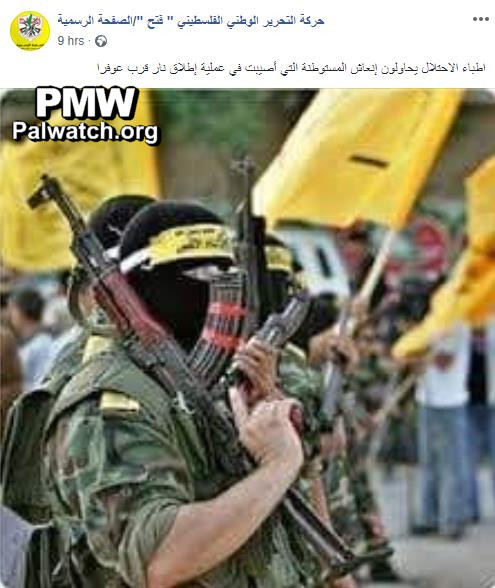

By Nan Jacques Zilberdik
As the anniversary of Abbas' Fatah approaches - celebrated on the day of their first attempted terror attack against Israel in 1965 - the movement is emphasizing its values to the Palestinian public.One of those values is Fatah's devotion to "the armed struggle" against Israel and Fatah's adoration for the rifle.
In an informative post on the terrorist attack three days ago in which 7 Israelis were wounded when terrorists shot at them, Fatah chose to adorn the post with the photo above showing masked Fatah members in military uniforms with assault rifles and yellow Fatah headbands.
Fatah overtly stressed its adherence to "the armed struggle" in another post showing a photo of a procession of masked men wearing military uniforms and carrying torches and yellow Fatah flags:
"Fatah is the torch of the armed struggle."
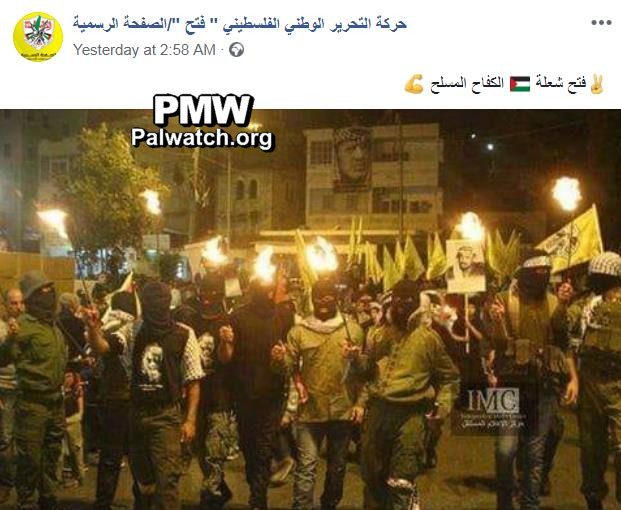
[Official Fatah Facebook page, Dec. 8, 2018]
In another post, Fatah directly stated that it won't abandon "the rifle": "The 54th anniversary of the Intilaqa ("the Launch" of Fatah)
The revolution continues, and we will not drop the rifle."
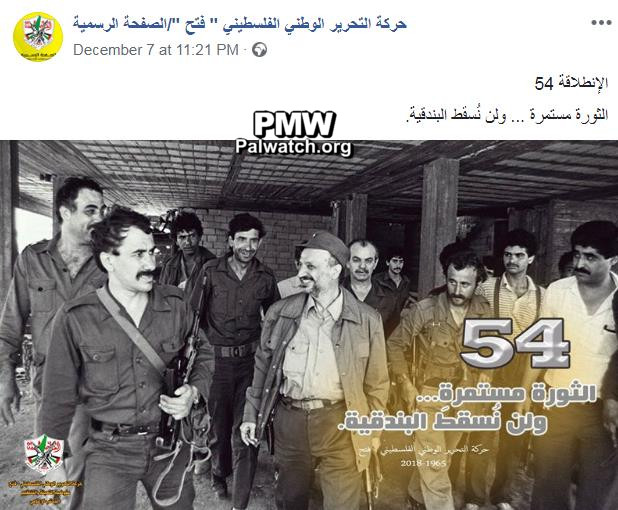
[Official Fatah Facebook page, Dec. 7, 2018]
This announcement echoes a recent statement by Fatah Central Committee member Abbas Zaki that was exposed by Palestinian Media Watch, in which Zaki declared that "the rifle will never fall."On PA TV, Zaki quoted Arafat's famous UN speech in 1974, when Arafat said he was "bearing an olive branch and a revolutionary's gun," and asked the UN "not to let the olive branch fall." Zaki explained that Arafat had focused specifically on the image of the olive branch not falling, because "the rifle will never fall, even today." [Official PA TV, Palestine This Morning, Nov. 11, 2018]
Among Fatah's messages to Palestinians is also the profiling of terrorist murderers as heroes. Two recent examples are the following, in which both murderers are shown with rifles:
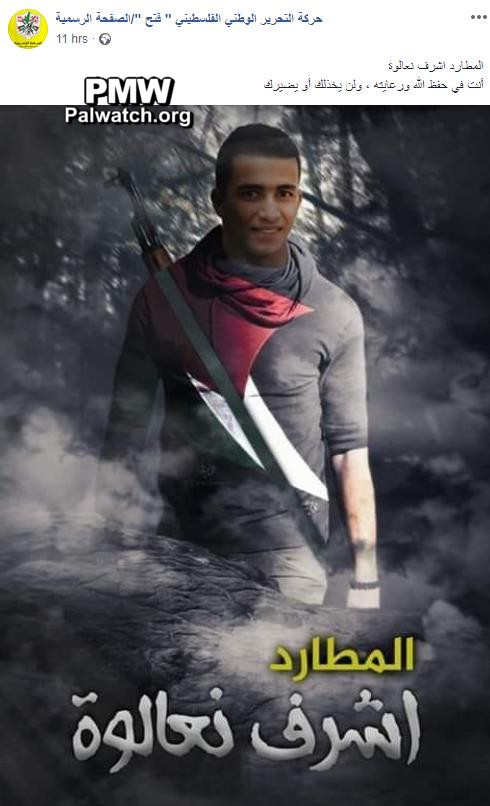
Text on image: "The wanted one Ashraf Na'alwa"
Posted text: "The wanted one Ashraf Na'alwa
Allah is protecting you and taking care of you, He will not abandon you or harm you"
[Official Fatah Facebook page, Nov. 28, 2018]
Fatah and the PA have repeatedly established that one of Palestinian society's role models is terrorist murderer Dalal Mughrabi, who in 1978 led the murder of 37 Israeli civilians, 12 of them children. Fatah stressed this again last week, posting a photo of Mughrabi posing with an assault rifle: 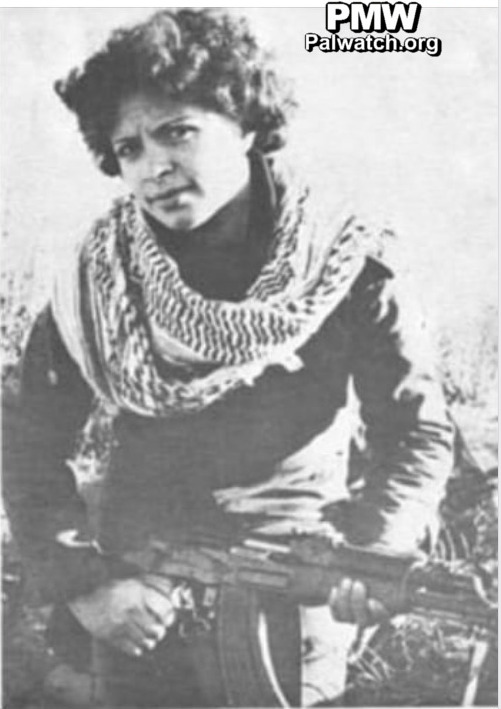
Posted text: "Dalal Mughrabi 1958-1978, a young Palestinian woman who... took part in the military operation (i.e., terror attack) known as the 'Coastal Road Massacre' in Israel on March 14, 1978, which led to the death of 38 Israeli civilians (sic., 37), including 13 children (sic., 12).
Mughrabi was killed together with eight other armed people during the operation. She is glorified as a Martyr (Shahida) and national hero among some of the Palestinians, while in Israel and several additional states they view her as a terrorist..."
[Official Fatah Facebook page, Dec. 6, 2018]
The following are longer excerpts of Fatah's posts on the terror attack in Ofra and its post on terrorist murderer Dalal Mughrabi:Posted text: "The occupation's doctors are attempting to resuscitate the female settler who was wounded in the shooting operation (i.e., terror attack) next to Ofra."
[Official Fatah Facebook page, Dec. 9, 2018]
Ofra shooting attack - terrorists shot and wounded 7 Israelis - a pregnant woman, her husband, another man, and 4 teenagers - in a drive-by shooting attack next to Ofra, north of Jerusalem, on Dec. 9, 2018. The terrorists have not been apprehended as of Dec. 12, 2018.Note: Fatah copied the following text (except the hashtag at the end) from the Arabic Wikipedia entry for Dalal Mughrabi:
Posted text: "Dalal Mughrabi (i.e., terrorist who led murder of 37, 12 of them children), 1958-1978, a young Palestinian woman who was born in 1958 in the Sabra refugee camp near Beirut to a Lebanese mother and a father from Jaffa who found shelter in Lebanon following the 1948 Nakba (i.e., "the catastrophe," the Palestinian term for the establishment of the State of Israel)...
She took part in the military operation (i.e., terror attack) known as the 'Coastal Road Massacre' in Israel on March 14, 1978, which led to the death of 38 Israeli civilians (sic., 37), including 13 children (sic., 12).
Mughrabi was killed together with eight other armed people during the operation. She is glorified as a Martyr (Shahida) and national hero among some of the Palestinians, while in Israel and several additional states they view her as a terrorist...
#Praise_and_eternity_to_the_Martyrs"
[Official Fatah Facebook page, Dec. 6, 2018]
Dalal Mughrabi led the most lethal terror attack in Israel's history, known as the Coastal Road massacre, in 1978, when she and other Fatah terrorists hijacked a bus on Israel's Coastal Highway, murdering 37 civilians, 12 of them children, and wounding over 70.Yasser Arafat - Founder of the PLO and Fatah, former chairman of the PA. During the 1960s, 70s and 80s Arafat was behind numerous terror attacks against Israelis. Although he received the Nobel Peace Prize in 1994 together with then Israeli Prime Minister Yitzhak Rabin and then Israeli Minister of Foreign Affairs Shimon Peres "for their efforts to create peace in the Middle East" after signing the Oslo Accords peace agreement, Arafat launched a 5-year terror campaign - the second Intifada (2000-2005) - in which more than 1,000 Israelis were murdered. Arafat died of an illness in 2004.
Intilaqa - "the Launch" refers to the beginning of Fatah on Jan. 1, 1965, when it carried out its first terror attack against Israel, attempting to blow up Israel's National Water Carrier.
Barkan Industrial Zone Attack - 23-year-old Palestinian terrorist Ashraf Walid Suleiman Na'alwa shot and murdered 2 Israelis, Kim Levengrond-Yehezkel and Ziv Hajbi, in a factory in the Barkan Industrial Zone near Ariel on Oct. 7, 2018. Na'alwa fled the scene and has not yet been apprehended as of Dec. 11, 2018. Until this attack, the Barkan Industrial Zone had been an example of coexistence with Israelis and Palestinians working together.
Barkan Industrial Zone Attack - 23-year-old Palestinian terrorist Ashraf Walid Suleiman Na'alwa shot and murdered 2 Israelis, Kim Levengrond-Yehezkel and Ziv Hajbi, in a factory in the Barkan Industrial Zone near Ariel on Oct. 7, 2018. Na'alwa fled the scene and has not yet been apprehended as of Dec. 12, 2018. Until this attack, the Barkan Industrial Zone had been an example of coexistence with Israelis and Palestinians working together.
